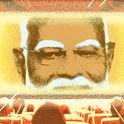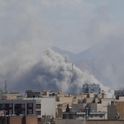After the Reagan administration took a soft line on Israel's invasion of Lebanon in June 1982, Margaret Thatcher scrawled in pen on a diplomatic cable received from Washington: “The US just does not realise the resentment she is causing in the Middle East.” Thatcher feared that extremist forces such as the Soviet Union would make maximum gains in the Arab world from the missteps of the Israelis and Americans.
It is the same story today. British Prime Minister Theresa May has condemned Trump’s recent decision to recognise Jerusalem as Israel’s capital as “unhelpful” for peace. The president has also said that he is directing the US State Department to prepare for moving the US embassy from Tel Aviv to Jerusalem.
But why all the fuss? After all, for three millennia, Jerusalem has been at the heart of the Jewish faith. And from Israel's perspective, the city has been the capital since 1949. Israel’s Knesset, its Supreme Court and government ministries are located there. Foreign heads of state, politicians and diplomats meet there with their Israeli counterparts. The problem is that Israel also claims east Jerusalem (which it captured in the 1967 war) as part of its capital, which the Palestinians claim for themselves. Trump is riding roughshod over decades of US policy which has cautiously refrained from supporting this position, out of awareness of the sensitivity around Jerusalem in the Israeli-Palestinian conflict.
Trump went ahead with his announcement because he wanted to keep a promise made prior to the election. As an anti-politician, Trump wants to prove that he stays true to his pledges, no matter the consequences. The lack of progress on many of his other promises will have made him even more determined on this one.
But this latest move is deeply misguided. In part, it is a question of phrasing and statecraft. Had the president declared that the US would recognize Jerusalem as Israel's capital as part of the endgame of a two-state solution, this would have been a welcome and constructive move—however unlikely that solution seems at the moment.
As soon as Trump made his announcement, the Czechs came out with a declaration of their own recognising Jerusalem as Israel’s capital. Yet there was an important difference: The Czechs made it clear that they recognised only West Jerusalem as Israel’s capital and that Jerusalem would be the capital city of both the State of Israel and a future State of Palestine. Furthermore, a future transfer of the Czech embassy to Jerusalem would take place only after further negotiations. That is precisely what the US president needed to do.
As things stand, Trump has undermined Washington’s ability to act as an honest broker and sabotaged his own efforts—and those of his son-in-law, Jared Kushner—to resolve the conflict.
Is it possible that this was all part of a ploy to pressure Israel into making painful concessions further down the road? Perhaps. But the firebrand Israeli politician Miri Regev was quoted this morning as saying that she didn't believe this interpretation. Nothing that the Trump administration has said or done thus far suggests it would put Israel under any pressure. Although Trump did express support for the two-state solution yesterday, he made it clear that this would happen only if both parties wanted to go down that path.
In the meantime, Trump’s announcement looks already to have led to increased violence in Ramallah and other places in the West Bank and Gaza strip, with fighting breaking out between Palestinian protesters and Israeli soldiers.
It is also a propaganda gift for Turkey and Iran, as well as for Hamas, which has used the Trump announcement as a pretext to renew its call for violence against Israel. The Iranians are doing precisely what the Soviets did during an earlier era, championing the Palestinian cause over the heads of moderate Arab leaders in order to consolidate political influence in the region.
It will be interesting to see what happens to Israel’s flirtation with these moderate Arab states, such as Saudi Arabia. The conventional wisdom today has it that Saudi Arabia and the Gulf States are more concerned about the threat from Iran than Israel’s policy towards the Palestinians. In the wake of Trump’s statement, this supposition may face a strong challenge. Over recent years, many Israelis have pointed to the upheaval in Syria and other parts of the Arab world as proof that the Israeli-Palestinian conflict is a marginal issue in the Middle East. One fears that this claim may soon be tested to the limit.
Why Trump's Jerusalem announcement is so misguided
The president's decision to recognise Jerusalem as the Israeli capital is a propaganda gift to Turkey, Iran—and Hamas
December 07, 2017

President Donald Trump gives a statement on Jerusalem in the Diplomatic Reception Room of the White House in Washington, DC., on December 6, 2017. Photo: Oliver Contreras/SIPA USA/PA Images











